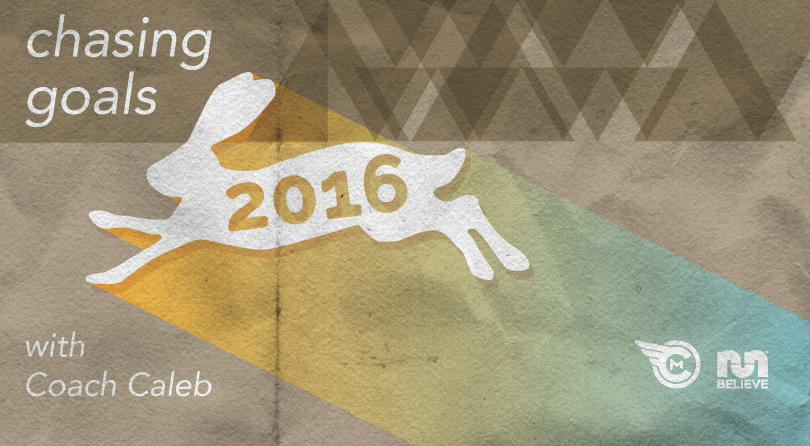
Have we made it through the initial crush of marketing campaigns that coincide with the New Year? Every gym, fitness magazine, and running product is vying for your attention. “New Year, New You!” “18 Resolutions You MUST Make in 2016!” “Your Best Year EVER!” The fact of the matter is that you are the same person today that you were a week ago in the olden days of 2015. And busted resolutions are such a cliche that you know the next round of articles and late-night jokes are going to be about what to do when you’ve already abandoned the whole list for the year. At the same time, you can use the fact that we’ve entered a new cycle on the Gregorian Calendar to your advantage since our human brains put a lot of stock in cyclical patterns. Now is a good a time as any to complete a goal-setting exercise that can actually work for you.
By Coach Caleb
In the context of running, here’s an arbitrarily generated, but pretty typical, list of resolutions:
As a coach, I commonly see two problems with the usual resolution process. The goals are often unattainable, and the goals are usually performance-based. Both of these factors set the goal-setter up for failure before they even start. Once they get a little way into the year, they already see that they will not hit all of their goals, and because they are focusing on performing to a specific level, they take the bad way out of this “all or nothing” mentality and give up. Then they revert back to their usual habits, or worse get discouraged and train even less than before.
If you want to set goals that will keep you motivated and won’t be a bust, you should focus on three themes:
It’s great to have long-term goals as a runner, and these can be of the sort that will take a lot of work over a long period of time. For example, the most common goal for runners I see is to qualify for the Boston Marathon. But, if the runner is training for their first marathon, or has run a time that is a long way from the BQ standard, this should be a long-term goal that might happen within the next 3-5 years. In terms of setting immediate goals, we must choose something we feasibly can accomplish in a reasonable amount of time, or else we will give up in frustration. A good annual goal might be to improve a marathon PR by 5-10 minutes, or to run a PR of any amount for one or two race distances. The act of setting the attainable goal and then actually achieving it will provide momentum for the next round of goals. None of this is possible unless the chosen goals are attainable.
Taking the focus off of performance goals is very hard for runners. After all, we measure our worth (rightly or wrongly) based on the times that we run, or the miles that we amass, or the age group awards that we collect. Performance “metrics” are the carrots that are everywhere. But, if you examine the differences between most everyday runners and most elite runners, you’ll see that the best runners tend to focus on mastering the sport by learning as much about their own body and how to train, rather than being overly focused on running specific times or mileage. The fact is that you don’t need to be stuck on performance-based goals when you have sufficient focus on mastery or process, because the performances take care of themselves. You improve through mastery of the key training concepts. So, instead of saying, “I want to run a 2:30 marathon (which is something I personally have been too focused on for a while),” I should instead be saying, “What can I learn and implement for my marathon training that will make me the fittest and most confident.” Or, in terms of nutrition and weight loss, saying, “I want to learn more about how nutrition impacts performance by cooking more meals at home,” is much more effective than saying, “I need to lose 5 pounds.” Focus on the process, focus on being your best. If you do that, the performance metrics will naturally improve.
This is the crucial final step which is often missed. If you can’t measure your progress, and if you aren’t held accountable for that progress, you’ll stop short of achieving your goal. Keep your measurements focused on the process, and recruit others to hold you accountable. Here are some ways to do that:
You can make this your best year ever, but you don’t need to rely on the assumed magic of a new calendar year to make that happen. Instead, take yourself through a mindful goal-setting process that sets you up for success. Then you’ll enjoy training, get more out of the process, and along the way you’ll become a better runner without being stuck on the specific results. –Coach Caleb
Have something to say? Leave a Comment